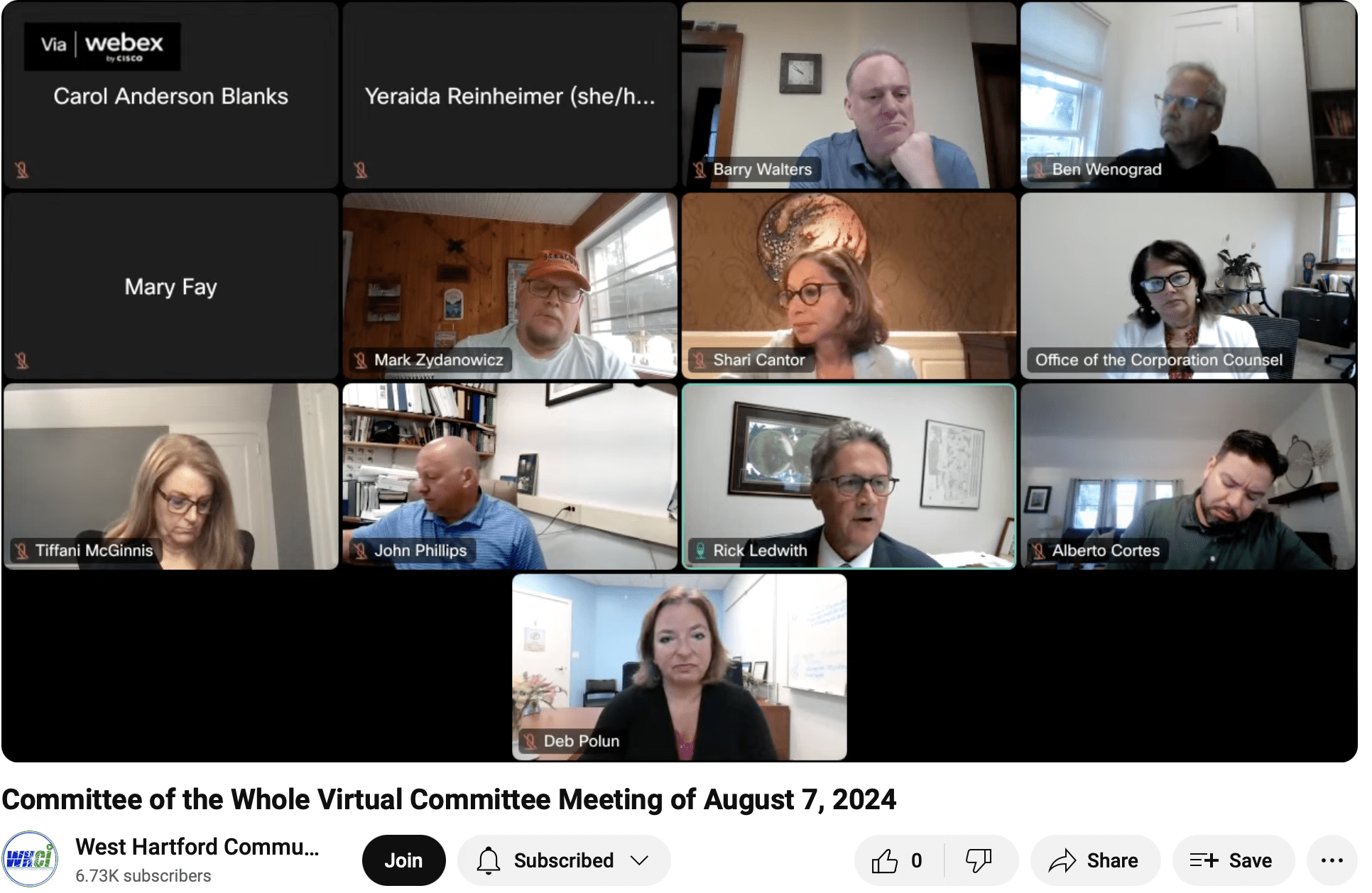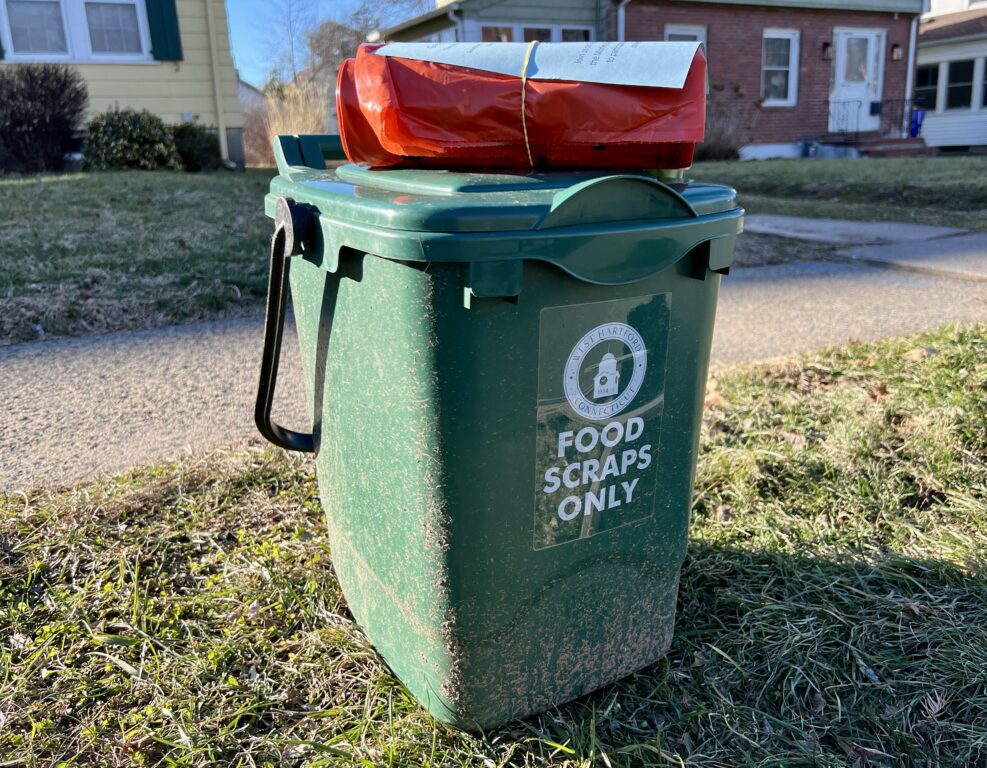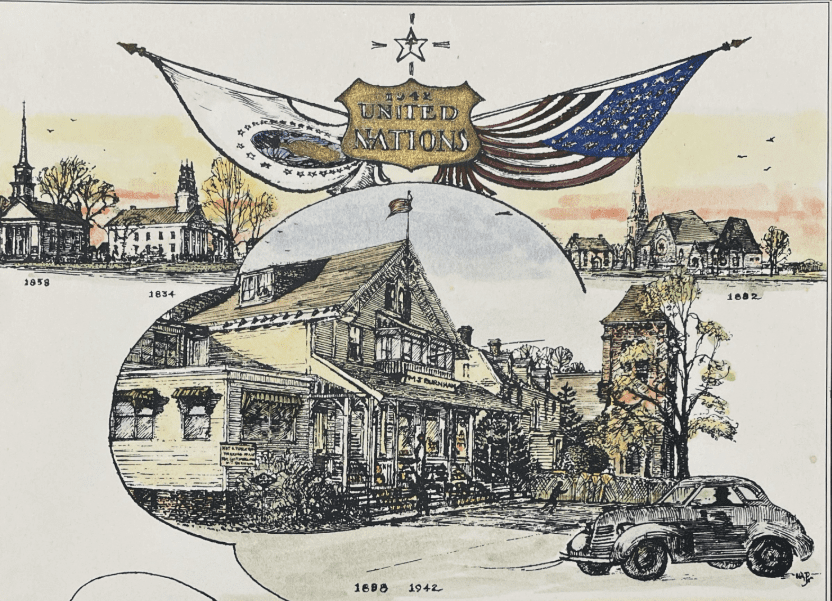West Hartford Will Consider Incremental Approach to Waste Reduction Rather Than Town-Wide Food Scrap Collection and Unit-Based Pricing

Audio By Carbonatix

West Hartford Town Council "Committee of a Whole" virtual meeting, Aug. 7, 2024. Screenshot
The West Hartford Town Council met as a ‘Committee of the Whole’ Wednesday morning to consider whether to implement a pilot program for food waste collection and unit-based pricing on a town-wide basis and decide to instead to explore waste reduction options on a more incremental basis.
By Ronni Newton
Members of the West Hartford Town Council acknowledge that the need to reduce the town’s municipal solid waste is important from environmental and fiscal standpoints. While town leaders also like to have the opportunity to lead the way for other communities around the state, by the time the Council finished meeting virtually as a “Committee of the Whole” Wednesday morning, the consensus was that now is not the time to implement a mandatory town-wide food waste diversion and unit-based pricing trash collection pilot.
Instead, the town will consider a food waste diversion program as the first step in significantly reducing municipal solid waste.
The Town Council had planned to vote on moving forward with the town-wide pilot at its June 25, 2024 meeting, but postponed the consideration when it became clear that an ordinance was going to be needed rather than just a resolution.
“Our success is going to be very critical for the state moving forward,” Mayor Shari Cantor said after Council members spent more than 90 minutes discussing the impact of a proposed ordinance and resolution that would have allowed implementation of a mandatory version of a food waste diversion and “pay as you throw” (also known as unit-based pricing) pilot. The program would expanded from the voluntary program that operated in a portion of the Morley neighborhood to the rest of the town.
Cantor said it became apparent that while West Hartford does like to be a leader, there are still too many potential roadblocks to implementing a successful program, and if the town fails, it could be a significant step back for statewide efforts to further trash reduction initiatives.
The “enforcement component is really the nuts and bolts of this pay-as-you-throw program,” Cantor said, and that’s one issue Council members seemed to view as a major potential stumbling block because it would require a commitment and investment in staff and technology to check for compliance as well as to manage fines and appeals for non-compliance with the program’s parameters.
While the Connecticut Department of Energy and Environmental Protection (DEEP) has offered to provide a $1.5 million grant that Town Manager Rick Ledwith said Wednesday would support the program for roughly six months of a year-long pilot, “We want to do the right thing … want to partner in a way that is going to be sustainable in the future,” Cantor said.
Doing nothing isn’t an option, Cantor said, and the Sustainable West Hartford Commission, largely through its Waste Working Group, has been educating the community about how to divert food waste and the importance of trash reduction. But when she asked councilors during Wednesday morning’s meeting if they were ready to move forward with the town-wide full-scale mandatory food waste and unit-based pricing program, no one raised their hand. The entire nine-person Town Council participated in the “Committee of the Whole” meeting due to the significance of the matter, rather than just keeping the discussion within the Public Works, Facilities and Sustainability Committee.
Cantor asked the town manager to explore options for a food waste diversion program, understanding there may be costs involved. While the cost of disposing of food waste is roughly $30 per ton less than the MSW tipping fees, there will be the investment in food waste bins as well as collection costs. “We do have ARPA money that was earmarked for sustainable projects,” Cantor said, which need to be allocated by the end of the year and then spent within two years.
In addition, Cantor said conversations with DEEP will continue to determine if they will consider use of the grant for food waste diversion only without the unit-based pricing portion, but she added that there is reason no other large community has moved forward with the plan the town was considering.
Ledwith said while the benefits of unit-based pricing on effecting change in behavior are clear, diverting food waste has significant benefits. He said discussions with DEEP will continue, and other grant options will be explored as well. According to Cantor, ARPA funds can be used for the capital investment of food waste collection bins.
Significantly reducing trash – and having a meaningful impact in Connecticut, where roughly 40% of waste needs to be shipped out of state due to lack of landfill or incineration capacity – is a three-pronged approach, Cantor said. It includes diverting food waste, but also building out the town’s transfer station so that residents have other options for disposal of both recyclable materials and other large items is also critical – and according to Director of Public Works John Phillips, that will take at least another 12 to 18 months.
The education piece is also critical, and more needs to be done, Cantor said, particularly since she said that 61% of those who responded to a survey conducted this year by a third party hired by the town indicated they were “not ready for a change right now.”
Ledwith, working with Phillips, will explore the costs of an opt-in program for a food waste collection program and will bring that information back to the Council’s Public Works, Facilities and Sustainability Committee.
Phillips confirmed to We-Ha.com on Wednesday that the cost for collection of food waste will range from $300,000 to $700,000, depending on the number of households that opt-in. The more that participate, the lower the unit costs, he said. Blue Earth was the contractor chosen through an RFP process for the Morley pilot program, but it would have to be put out to bid.
Quantum Biopower, in Southington, is currently the only facility in the state that can receive and process food waste.

During the Morley pilot, participants had food scraps collected weekly at the curb, and received orange bags for trash disposal as part of the unit-based pricing component of the initiative. Photo credit: Ronni Newton (we-ha.com file photo)
Key points about food waste diversion and unit-based pricing
- Cantor noted that West Hartford has been talking about unit-based pricing since 2016. Back then, when a pay-as-you-throw program was presented, about a third of the community was supportive, a third didn’t embrace it but understood a need for change, and a third was vehemently opposed. Those who understood the need for change were not ready then, and the idea was tabled.
- The Morley pilot program, which included just under 700 homes, was a “voluntary program that we did, and it was about 45% of that that voluntarily participated,” Cantor said. There was a lot of education and significant impact among those that did participate – who reduced their MSW by about half. However, she noted that the specific neighborhood was chosen because that it was not only a grid for easy collection but also an engaged neighborhood. “It was helpful to have a dense community … where a lot of people are in tune with what their neighbors were doing.”
- When the Public Works, Facilities and Sustainability Committee met on June 6, there was an extremely informative and effective presentation by then-Waste Working Group Chair Rachael Virgin. Following that meeting, it became clear that an ordinance, rather than just a resolution, would be needed for implementation of a mandatory pilot program to enforce the unit-based pricing component. “We didn’t have that opportunity to talk about that at our committee meeting on the 6th,” Cantor said.
- Ledwith said that while waste reduction provides multiple benefits to taxpayers, challenges includes the cost to residents of purchasing town-issued bags. “Building public consensus and overcoming that resistance to change,” is critical, he said.
- The cost for orange town-issued bags, as outlined in the ordinance, would be $2.50 for a 30-gallon bag, $1.25 for a 15-gallon bag, and $0.90 for an 8-gallon bag, Ledwith said. Prices “help change behavior,” Ledwith said, which won’t happen if the bag are given out for free. “Pricing of the bag has a little bit of skin in the game … folks will learn to recycle more.” While people use more bags now than they likely would under the program, the average cost of a trash bag purchased at a grocery store or place like Costco is currently 10-15 cents.
- “In excess of 60% of what we are putting in our green barrel should not be in that barrel,” Ledwith said. But more will be able to be properly separated and diverted once we have a transfer station.
- The town’s enforcement measures for non-compliance with existing trash and recycling rules are not enforced, not during his tenure, Phillips said. The mandatory pilot would include enforcement. “With this grant program enforcement would be divided into three phases,” Ledwith said, initially for the first month or two with teams of contracted staff assessing carts on each route each night and then moving to an AI camera system that would look at the color of the bags. Warnings would be given at first, but there would be fines after that. Following a warning, the ordinance calls for $50 for a second violation, $100 for the next violation, and $200 for the fourth violation. Most people currently “view trash collection as a service and not necessarily a utility,” Ledwith said, and that’s what would have to change.
- Statewide, Stonington has adopted a version of a pay-as-you-throw program. Phillips said that a small section of Middletown has had success with a program as well, but “they collect in one week what we collect in one day.”
- Council member Tiffani McGinnis, who lives in the Morley Pilot area and participated in the program, said it really changed her behavior and made her think about what she was purchasing. “I was surprised at how much I was throwing away,” she said.
- McGinnis asked about the process of fines, or the option of not picking up trash as a measure, and what happens if the fines are not paid. Ledwith said not picking up the trash could cause a problem with bears.
- Phillips said there is not a single street in town right now without violations of the current trash and recycling regulations.
- “When someone is issued a citation they do have the ability to issue an appeal,” Deputy Corporation Counsel Gina Varano said. There is currently one hearing officer, who is not a town employee, but more would definitely be needed and other additional costs could include developing systems to send out delinquency notices. Usually it’s at least a year to 18 months before non-payment leads the town to seek resolution through the courts.
- “I really believe that we need to address many more issues and that takes time,” Councilor Carol Blanks said, noting the need for dealing with bulky waste, as well as educating people who are new to town about the regulations.
- Council member Mary Fay said the cost of bags is a “big resistance point” but Ledwith said there needs to be the cost to change behavior. “Would it make more sense to let another municipality go first?” Fay also said, adding that residents are “very, very nervous” due to changes in town such as road diets and development.
- Potential legal costs and additional staff to administer and enforce is a potential problem, Minority Leader Mark Zydanowicz said. As a percentage, people were not excited about this, he said. “Is the tail wagging the dog on the pilot program for this?” he asked, also asking how new residents would be educated. “Oftentimes leadership is not always the ‘tip of the spear,’” Zydanowicz said, questioning the need to be first in the state.
- Cantor said she didn’t initially realize the potential extra staffing that would be needed, and also said, “Being first is big and there is a lot of risk … if West Hartford not successful being first could be something that hurts the whole trajectory of the state.”
- Council member Deb Polun asked about easing into enforcement, which Ledwith said would happen through educational acknowledging that there are hardships. She also asked whether the responsibility for compliance rests with landlords or tenants. Varano said the program would apply only to single- through three-family residences, and the burden would be “on property owner to ensure trash is properly separated.”
- Council member Barry Walters, who chairs the Public Works, Facilities and Sustainability Committee asked if there are grants available for food waste diversion only – either through DEEP or elsewhere – and Ledwith said that DEEP’s $1.5 million grant may not be available without the full program, but that they will pursue it as well as other options.
- Walters also said he thinks having the transfer station available as soon as possible is critical. Phillips said it’s fully funded, but will take at least a year to 18 months before being ready, adding that that having a transfer station, which would allow the town to move beyond just having a drop-off for recyclables, would provide options for disposal of additional materials generated by residents, such as construction material from do-it-yourself projects. “It would certainly provide a robust option,” he said, but still require major reliance on residents to take advantage of it.
- Council member Alberto Cortes raised concerns “this is punitive from day one,” in terms being stuck with the orange bags. Some residents, like his household, prefer the scented bags and would have to use two bags. Also, he expressed concerns with bears and rodents if trash would not be picked up as a penalty, and noted that the town chose the Morley neighborhood for a reason. How about other neighborhoods that may not be poised for success, he asked.
- Documents related to Wednesday morning’s discussion, including the draft ordinance and resolution and survey results, can be found here.
“What I’m hearing … certainly doesn’t sound like we have anything near consensus,” Deputy Mayor Ben Wenograd said after the other Council members had asked questions and shared comments. He has concerns as well, and added that “at this point I think we need to talk about what we do next.”
Although the town didn’t have big increase in tipping fees expected when the current contract with Reworld (formerly called Covanta) was negotiated that would have made the need for trash reduction more urgent, Wenograd said that rather than going back to drawing board, the next step should be finding out the cost of just implementing organics recycling.
Bernie Pelletier, who chairs the Sustainable West Hartford Commission but sharing his own opinion and not speaking on behalf of the Waste Working Group or the Commission, told We-Ha.com that he accepts the decision made Wednesday by the Town Council’s Committee of the Whole. “They don’t think the town is ready,” he said.
However, he noted that due to the structure of the virtual meeting there was no opportunity for dialogue. What West Hartford does is important, and will be looked at by the state’s other 168 municipalities, he said.
“Because West Hartford is viewed so highly by other municipalities, it’s important that those answers be shared with the community,” Pelletier said. “West Hartford is one of the leading towns in Connecticut, but should realize that about half of our neighbors to the north have done this so it’s not impossible,” he said of Massachusetts, where 44% of the state’s municipalities have implemented some form of unit-based pricing.
Like what you see here? Click here to subscribe to We-Ha’s newsletter so you’ll always be in the know about what’s happening in West Hartford! Click the blue button below to become a supporter of We-Ha.com and our efforts to continue producing quality journalism.




I think the biggest concern the last time around was where the money for the bags was going. If I recall correctly, the money was going to go to the general fund instead of a fund designed for waste management. I hope this time around it is different, if indeed that was the case.